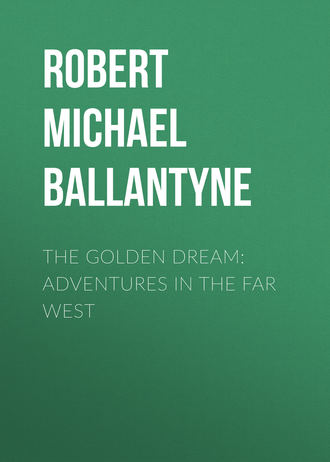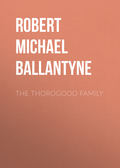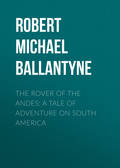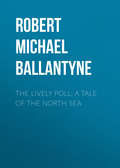
Robert Michael Ballantyne
The Golden Dream: Adventures in the Far West
Chapter Twenty Two.
Powerful Effects of Gold on the Aspect of Things in General—The Doings at Little Creek Diggings—Larry becomes Speculative, and digs a Hole which nearly proves the Grave of many Miners—Captain Bunting takes a Fearful Dive—Ah-wow is smitten to the Earth—A Mysterious Letter, and a Splendid Dish
We must now beg our reader to turn with us to another scene.
The appearance of Little Creek diggings altered considerably, and for the worse, after Ned Sinton and Tom Collins left. A rush of miners had taken place in consequence of the reports of the successful adventurers who returned to Sacramento for supplies, and, in the course of a few weeks, the whole valley was swarming with eager gold-hunters. The consequence of this was that laws of a somewhat stringent nature had to be made. The ground was measured off into lots of about ten feet square, and apportioned to the miners. Of course, in so large and rough a community, there was a good deal of crime, so that Judge Lynch’s services were frequently called in; but upon the whole, considering the circumstances of the colony, there was much less than might have been expected.
At the time of which we write, namely, several weeks after the events narrated in our last chapter, the whole colony was thrown into a state of excitement, in consequence of large quantities of gold having been discovered on the banks of the stream, in the ground on which the log-huts and tents were erected. The result of this discovery was, that the whole place was speedily riddled with pits and their concomitant mud-heaps, and, to walk about after night-fall, was a difficult as well as a dangerous amusement. Many of the miners pulled down their tents, and began to work upon the spots on which they previously stood. Others began to dig all round their wooden huts, until these rude domiciles threatened to become insular, and a few pulled their dwellings down in order to get at the gold beneath them.
One man, as he sat on his door-step smoking his pipe after dinner, amused himself by poking the handle of an axe into the ground, and, unexpectedly, turned up a small nugget of gold worth several dollars. In ten minutes there was a pit before his door big enough to hold a sheep, and, before night, he realised about fifty dollars. Another, in the course of two days, dug out one hundred dollars behind his tent, and all were more or less fortunate.
At this particular time, it happened that Captain Bunting had been seized with one of his irresistible and romantic wandering fits, and had gone off with the blunderbuss, to hunt in the mountains. Maxton, having heard of better diggings elsewhere, and not caring for the society of our adventurers when Ned and Tom were absent, had bid them good-bye, and gone off with his pick and shovel on his shoulder, and his prospecting-pan in his hand, no one knew whither. Bill Jones was down at Sacramento purchasing provisions, as the prices at the diggings were ruinous; and Ko-sing had removed with one of the other Chinamen to another part of the Creek.
Thus it came to pass that Larry O’Neil and Ah-wow, the Chinaman, were left alone to work out the claims of the party.
One fine day, Larry and his comrade were seated in the sunshine, concluding their mid-day meal, when a Yankee passed, and told them of the discoveries that had been made further down the settlement.
“Good luck to ye!” said Larry, nodding facetiously to the man, as he put a tin mug to his lips, and drained its contents to the bottom. “Ha! it’s the potheen I’m fond of; not but that I’ve seen better; faix I’ve seldom tasted worse, but there’s a vartue in goold-diggin’ that would make akifortis go down like milk—it would. Will ye try a drop?”
Larry filled the pannikin as he spoke, and handed it to the Yankee, who, nothing loth, drained it, and returned it empty, with thanks.
“They’re diggin’ goold out o’ the cabin floors, are they?” said Larry, wiping his mouth with the sleeve of his shirt.
“They air,” answered the man. “One feller dug up three hundred dollars yesterday, from the very spot where he’s bin snorin’ on the last six months.”
“Ah! thin that’s a purty little sum,” said Larry, with a leer that shewed he didn’t believe a word of it. “Does he expect more to-morrow, think ye?”
“Don’t know,” said the man, half offended at the doubt thus cast on his veracity; “ye better go an’ ax him. Good day, stranger;” and the Yankee strode away rapidly.
Larry scratched his head; then he rubbed his nose, and then his chin, without, apparently, deriving any particular benefit from these actions. After that, he looked up at Ah-wow, who was seated cross-legged on the ground opposite to him, smoking, and asked him what was his opinion.
“Dun no,” said the Chinaman, without moving a muscle of his stolid countenance.
“Oh! ye’re an entertainin’ cratur, ye are; I’ll just make a hole here where I sit, an’ see what comes of it. Sure it’s better nor doin’ nothin’.”
Saying this, Larry refilled his empty pipe, stretched himself at full length on his side, rested his head on his left hand, and smoked complacently for three minutes; after which he took up the long sheath-knife, with which he had just cut up his supper, and began carelessly to turn over the sod.
“Sure, there is goold,” he said, on observing several specks of the shining metal. As he dug deeper down, he struck upon a hard substance, which, on being turned up, proved to be a piece of quartz, the size of a hen’s egg, in which rich lumps and veins of gold were embedded.
“May I niver!” shouted the Irishman, starting up, and throwing away his pipe in his excitement, “av it isn’t a nugget. Hooray! where’s the pick!”
Larry overturned the Chinaman, who sat in his way, darted into the tent for his pick and shovel, and in five minutes was a foot down into the earth.
He came upon a solid rock, however, much to his chagrin, a few inches further down.
“Faix I’ll tell ye what I’ll do,” he said, as a new idea struck him, “I’ll dig inside o’ the tint. It ’ll kape the sun an’ the rain off.”
This remark was made half to himself and half to Ah-wow, who, having gathered himself up, and resumed his pipe, was regarding him with as much interest as he ever regarded anything. As Ah-wow made no objection, and did not appear inclined to volunteer an opinion, Larry entered the tent, cleared all the things away into one corner, and began to dig in the centre of it.
It was fortunate that he adopted this plan: first, because the rainy season having now set in, the tent afforded him shelter; and secondly, because the soil under the tent turned out to be exceedingly rich—so much so, that in the course of the next few days he and the Chinaman dug out upwards of a thousand dollars.
But the rains, which for some time past had given indubitable hints that they meant to pay a long visit to the settlement, at last came down like a waterspout, and flooded Larry and his comrade out of the hole. They cut a deep trench round the tent, however, to carry off the water, and continued their profitable labour unremittingly.
The inside of the once comfortable tent now presented a very remarkable appearance. All the property of the party was thrust into the smallest possible corner, and Larry’s bed was spread out above it; the remainder of the space was a yawning hole six feet deep, and a mound of earth about four feet high. This earth formed a sort of breast-work, over which Larry had to clamber night and morning in leaving and returning to his couch. The Chinaman slept in his own little tent hard by.
There was another inconvenience attending this style of mining which Larry had not foreseen when he adopted it, and which caused the tent of our adventurers to become a sort of public nuisance. Larry had frequently to go down the stream for provisions, and Ah-wow being given to sleep when no one watched him, took advantage of those opportunities to retire to his own tent; the consequence was, that strangers who chanced to look in, in passing, frequently fell headlong into the hole ere they were aware of its existence, and on more than one occasion Larry returned and found a miner in the bottom of it with his neck well-nigh broken.
To guard against this he hit upon the plan of putting up a cautionary ticket. He purchased a flat board and a pot of black paint with which he wrote the words:
“Mind Yer Feet Thars A Big Hol,” and fixed it up over the entrance. The device answered very well in as far as those who could read were concerned, but as there were many who could not read at all, and who mistook the ticket for the sign of a shop or store, the accidents became rather more frequent than before.
The Irishman at last grew desperate, and, taking Ah-wow by the pig-tail, vowed that if he deserted his post again, “he’d blow out all the brains he had—if he had any at all—an’ if that wouldn’t do, he’d cut him up into mince-meat, so he would.”
The Chinaman evidently thought him in earnest, for he fell on his knees, and promised, with tears in his eyes, that he would never do it again—or words to that effect.
One day Larry and Ah-wow were down in the hole labouring for gold as if it were life. It was a terribly rainy day—so bad, that it was almost impossible to keep the water out. Larry had clambered out of the hole, and was seated on the top of the mud-heap, resting himself and gazing down upon his companion, who slowly, but with the steady regularity of machinery, dug out the clay, and threw it on the heap, when a voice called from without—
“Is this Mr Edward Sinton’s tent?”
“It is that same,” cried Larry, rising; “don’t come in, or it’ll be worse for ye.”
“Here’s a letter for him, then, and twenty dollars to pay.”
“Musha! but it’s chape postage,” said Larry, lifting the curtain, and stepping out; “couldn’t ye say thirty, now?”
“Come, down with the cash, and none o’ yer jaw,” said the man, who was a surly fellow, and did not seem disposed to stand joking.
“Oh! be all manes, yer honour,” retorted Larry, with mock servility, as he counted out the money. “Av it wouldn’t displase yer lordship, may I take the presumption to ax how the seal come to be broken?”
“I know nothin’ about it,” answered the man, as he pocketed the money; “I found it on the road between this an’ Sacramento, and, as I was passin’ this way anyhow, I brought it on.”
“Ah, thin, it was a great kindness, intirely, to go so far out o’ yer way, an’ that for a stranger, too, an’ for nothin’—or nixt thing to it!” said Larry, looking after the man as he walked away.
“Well, now,” he continued, re-entering the tent, and seating himself again on the top of the mud-heap, while he held the letter in his hand at arm’s length, “this bates all! An’ whot am I to do with it? Sure it’s not right to break the seal o’ another man’s letter; but then it’s broke a’ready, an’ there can be no sin in raidin’ it. Maybe,” he continued, with a look of anxiety, “the poor lad’s ill, or dead, an’ he’s wrote to say so. Sure, I would like to raid it—av I only know’d how; but me edication’s bin forgot, bad luck to the schoolmasters; I can only make out big print—wan letter at a time.”
The poor man looked wistfully at the letter, feeling that it might possibly contain information of importance to all of them, and that delay in taking action might cause irreparable misfortune. While he meditated what had best be done, and scanned the letter in all directions, a footstep was heard outside, and the hearty voice of Captain Bunting shouted:
“Ship ahoy! who’s within, boys!”
“Hooroo! capting,” shouted Larry, jumping up with delight; “mind yer fut, capting, dear; don’t come in.”
“Why not?” inquired the captain, as he lifted the curtain.
“Sure, it’s no use tellin’ ye now!” said Larry, as Captain Bunting fell head-foremost into Ah-wow’s arms, and drove that worthy creature—as he himself would have said—“stern-foremost” into the mud and water at the bottom. The captain happened to have a haunch of venison on his shoulder, and the blunderbuss under his arm, so that the crash and the splash, as they all floundered in the mud, were too much for Larry, who sat down again on the mud-heap and roared with laughter.
It is needless to go further into the details of this misadventure. Captain Bunting and the Chinaman were soon restored to the upper world, happily, unhurt; so, having changed their garments, they went into Ah-wow’s tent to discuss the letter.
“Let me see it, Larry,” said the captain, sitting down on an empty pork cask.
Larry handed him the missive, and he read as follows:—
“San Francisco.
“Edward Sinton, Esquire, Little Creek Diggings.
“My Dear Sir,—I have just time before the post closes, to say that I only learned a few days ago that you were at Little Creek, otherwise I should have written sooner, to say that—”
Here the captain seemed puzzled. “Now, ain’t that aggravatin’?” he said; “the seal has torn away the most important bit o’ the letter. I wish I had the villains by the nose that opened it! Look here, Larry, can you guess what it was?”
Larry took the letter, and, after scrutinising it with intense gravity and earnestness, returned it, with the remark, that it was “beyant him entirely.”
“That—that—” said the captain, again attempting to read, “that—somethin’—great success; so you and Captain Bunting had better come down at once.
“Believe me, my dear Sir, Yours faithfully, John Thomson.”
“Now,” remarked the captain, with a look of chagrin, as he laid down the letter, folded his hands together, and gazed into Larry’s grave visage, “nothin’ half so tantalisin’ as that has happened to me since the time when my good ship, the Roving Bess, was cast ashore at San Francisco.”
“It’s purvokin’,” replied Larry, “an’ preplexin’.”
“It’s most unfortunate, too,” continued the captain, knitting up his visage, “that Sinton should be away just at this time, without rudder, chart, or compass, an’ bound for no port that any one knows of. Why, the fellow may be deep in the heart o’ the Rocky Mountains, for all I can tell. I might start off at once without him, but maybe that would be of no use. What can it be that old Thompson’s so anxious about? Why didn’t the old figur’-head use his pen more freely—his tongue goes fast enough to drive the engines of a seventy-four. What is to be done?”
Although Captain Bunting asked the question with thorough earnestness and much energy, looking first at Larry and then at Ah-wow, he received no reply. The former shook his head, and the latter stared at him with a steady, dead intensity, as if he wished to stare him through.
After a few minutes’ pause, Larry suddenly asked the captain if he was hungry, to which the latter replied that he was; whereupon the former suggested that it was worth while “cookin’ the haunch o’ ven’son,” and offered to do it in a peculiar manner, that had been taught to him not long ago by a hunter, who had passed that way, and fallen into the hole in the tent and sprained his ankle, so that he, (Larry), was obliged to “kape him for a week, an’ trate him to the best all the time.” The proposal was agreed to, and Larry, seizing the haunch, which was still covered with the mud contracted in “the hole,” proceeded to exhibit his powers as a cook.
The rain, which had been coming down as if a second flood were about to deluge the earth, had ceased at this time, and the sun succeeded, for a few hours, in struggling through the murky clouds and pouring a flood of light and heat over hill and plain; the result of which was, that, along the whole length of Little Creek, there was an eruption of blankets, and shirts, and inexpressibles, and other garments, which stood much in need of being dried, and which, as they fluttered and flapped their many-coloured folds in the light breeze, gave the settlement the appearance—as Captain Bunting expressed it—of being “dressed from stem to stern.” The steam that arose from these habiliments, and from the soaking earth, and from the drenched forest, covered the face of nature with a sort of luminous mist that was quite cheering, by contrast with the leaden gloom that had preceded it, and filled with a romantic glow the bosoms of such miners as had any romance left in their natures.
Larry O’Neil was one of these, and he went about his work whistling violently. We will not take upon us to say how much of his romance was due to the haunch of venison. We would not, if called on to do it, undertake to say how much of the romance and enjoyment of a pic-nic party would evaporate, if it were suddenly announced that “the hamper” had been forgotten, or that it had fallen and the contents been smashed and mixed. We turn from such ungenerous and gross contemplations to the cooking of that haunch of venison, which, as it was done after a fashion never known to Soyer, and may be useful in after-years to readers of this chronicle, whose lot it may be, perchance, to stand in need of such knowledge, we shall carefully describe.
It is not necessary to enlarge upon the preliminaries. We need hardly say that Larry washed off the mud, and that he passed flattering remarks upon his own abilities and prowess, and, in very irreverent tones and terms, addressed Ah-wow, who smoked his pipe and looked at him. All that, and a great deal more, we leave to our reader’s well-known and vivid imagination. Suffice it that the venison was duly washed, and a huge fire, with much difficulty, kindled, and a number of large stones put into it to heat. This done, Larry cut off a lump of meat from the haunch—a good deal larger than his own head, which wasn’t small—the skin with the hair on being cut off along with the meat. A considerable margin of flesh was then pared off from the lump, so as to leave an edging of hide all round, which might overlap the remainder, and enclose it, as it were, in a natural bag.
At this stage of the process Larry paused, looked admiringly at his work, winked over the edge of it at Ah-wow, and went hastily into the tent, whence he issued with two little tin canisters,—one containing pepper, the other salt.
“Why, you beat the French all to nothing!” remarked the captain, who sat on an upturned tea-box, smoking and watching the proceedings.
“Ah! thin, don’t spake, capting; it’ll spile yer appetite,” said Larry, sprinkling the seasoning into the bag and closing it up by means of a piece of cord. He then drew the red-hot stones and ashes from the fire, and, making a hot-bed thereof, placed the venison-dumpling—if we may be allowed the term—on the centre of it. Before the green hide was quite burned through, the dish was “cooked,” as Yankees express it, “to a curiosity,” and the tasting thereof would have evoked from an alderman a look, (he would have been past speaking!) of ecstasy, while a lady might have exclaimed, “Delicious!” or a schoolboy have said, “Hlpluhplp,”2 or some such term which ought only to be used in reference to intellectual treats, and should never be applied to such low matters as meat and drink.
Chapter Twenty Three.
The Rainy Season, and its Effects—Disease and Misery at Little Creek—Reappearance of Old Friends—An Emigrant’s Death—An Unexpected Arrival
Captain Bunting, after two days’ serious consideration, made up his mind to go down alone to San Francisco, in order to clear up the mystery of the letter, and do all that he could personally in the absence of his friend. To resolve, however, was easy; to carry his resolution into effect was almost impracticable, in consequence of the inundated state of the country.
It was now the middle of November, and the rainy season, which extends over six months of the year, was in full play. Language is scarcely capable of conveying, to those who have not seen it, an adequate idea of how it rained at this period of the year. It did not pour—there were no drops—it roared a cataract of never-ending ramrods, as thick as your finger, straight down from the black sky right through to the very vitals of the earth. It struck the tents like shot, and spirted through the tightest canvas in the form of Scotch-mist. It swept down cabin chimneys, and put out the fires; it roared through every crevice, and rent and seam of the hills in mad cataracts, and swelled up the Little Creek into a mighty surging river.
All work was arrested; men sat in their tents on mud-heaps that melted from below them, or lay on logs that well-nigh floated away with them; but there was not so much grumbling as one might have expected. It was too tremendous to be merely annoying. It was sublimely ridiculous,—so men grinned, and bore it.
But there were many poor miners there, alas! who could not regard that season in a light manner. There were dozens of young and middle-aged men whose constitutions, although good, perhaps, were not robust, and who ought never to have ventured to seek their fortunes in the gold-regions. Men who might have lived their full time, and have served their day and generation usefully in the civilised regions of the world, but who, despite the advice of friends, probably, and certainly despite the warnings of experienced travellers and authors, rushed eagerly to California to find, not a fortune, but a grave. Dysentery, scurvy in its worst and most loathsome type, ague, rheumatism, sciatica, consumption, and other diseases, were now rife at the diggings, cutting down many a youthful plant, and blasting many a golden dream.
Doctors, too, became surprisingly numerous, but these disciples of Esculapius failed to effect cures, and as their diplomas, when sought for, were not forthcoming, they were ultimately banished en masse by the indignant miners. One or two old hunters and trappers turned out in the end to be the most useful doctors, and effected a good many cures with the simple remedies they had become acquainted with among the red-men.
What rendered things worse was that provisions became scarce, and, therefore, enormously dear. No fresh vegetables of any kind were to be had. Salt, greasy and rancid pork, bear’s-meat, and venison, were all the poor people could procure, although many a man there would have given a thousand dollars—ay, all he possessed—for a single meal of fresh potatoes. The men smitten with scurvy had, therefore, no chance of recovering. The valley became a huge hospital, and the banks of the stream a cemetery.
There were occasional lulls, however, in this dismal state of affairs. Sometimes the rain ceased; the sun burst forth in irresistible splendour, and the whole country began to steam like a caldron. A cart, too, succeeded now and then in struggling up with a load of fresh provisions; reviving a few sinking spirits for a time, and almost making the owner’s fortune; but, at the best, it was a drearily calamitous season,—one which caused many a sick heart to hate the sight and name of gold, and many a digger to resolve to quit the land, and all its treasures, at the first opportunity.
Doubtless, too, many deep and earnest thoughts of life, and its aims and ends, filled the minds of some men at that time. It is often in seasons of adversity that God shews to men how mistaken their views of happiness are, and how mad, as well as sinful, it is in them to search for joy and peace apart from, and without the slightest regard for, the Author of all felicity. Yes, there is reason to hope and believe that many seeds of eternal life were sown by the Saviour, and watered by the Holy Spirit, in that disastrous time of disease and death,—seed which, perhaps, is now blessing and fertilising many distant regions of the world.
In one of the smallest and most wretched of the huts, at the entrance of the valley of Little Creek, lay a man, whose days on earth were evidently few. The hut stood apart from the others, in a lonely spot, as if it shrank from observation, and was seldom visited by the miners, who were too much concerned about their own misfortunes to care much for those of others. Here Kate Morgan sat by the couch of her dying brother, endeavouring to soothe his last hours by speaking to him in the most endearing terms, and reading passages from the Word of God, which lay open on her knee. But the dying man seemed to derive little comfort from what she said or read. His restless eye roamed anxiously round the wretched hut, while his breath came short and thick from between his pale lips.
“Shall I read to ye, darlin’?” said the woman, bending over the couch to catch the faint whisper, which was all the poor man had strength to utter.
Just then, ere he could reply, the clatter of hoofs was heard, and a bronzed, stalwart horseman was seen through the doorless entrance of the hut, approaching at a brisk trot. Both horse and man were of immense size, and they came on with that swinging, heavy tread, which gives the impression of irresistible weight and power. The rider drew up suddenly, and, leaping off his horse, cried, “Can I have a draught of water, my good woman?” as he fastened the bridle to a tree, and strode into the hut.
Kate rose hurriedly, and held up her finger to impose silence, as she handed the stranger a can of water. But he had scarcely swallowed a mouthful when his eye fell on the sick man. Going gently forward to the couch, he sat down beside it, and, taking the invalid’s wrist, felt his pulse.
“Is he your husband?” inquired the stranger, in a subdued voice.
“No, sir,—my brother.”
“Does he like to have the Bible read to him?”
“Sometimes; but before his voice failed he was always cryin’ out for the priest. He’s a Catholic, sir, though I’m not wan meself and thinks he can’t be saved unless he sees the priest.”
The stranger took up the Bible, and, turning towards the man, whose bright eyes were fixed earnestly upon him, read, in a low impressive voice, several of those passages in which a free salvation to the chief of sinners is offered through Jesus Christ. He did not utter a word of comment; but he read with deep solemnity, and paused ever and anon to look in the face of the sick man as he read the blessed words of comfort. The man was not in a state either to listen to arguments or to answer questions, so the stranger wisely avoided both, and gently quitted the hut after offering up a brief prayer, and repeating twice the words—
“Jesus says, ‘Him that cometh to Me, I will in no wise cast out.’”
Kate followed him out, and thanked him earnestly for his kindness, while tears stood in her eyes.
“Have you no friends or relations here but him!” inquired the stranger.
“Not wan. There was wan man as came to see us often when we stayed in a lonesome glen further up the Creek, but we’ve not seen him since we came here. More be token he didn’t know we were goin’ to leave, and we wint off in a hurry, for my poor brother was impatient, and thought the change would do him good.”
“Take this, you will be the better of it.”
The stranger thrust a quantity of silver into Kate’s hand, and sprang upon his horse.
“I don’t need it, thank ’ee,” said Kate, hurriedly.
“But you may need it; at any rate, he does. Stay, what was the name of the man who used to visit you?”
“O’Neil, sir—Larry O’Neil.”
“Indeed! he is one of my mates. My name is Sinton—Edward Sinton; you shall hear from me again ere long.”
Ned put spurs to his horse as he spoke, and in another moment was out of sight.







